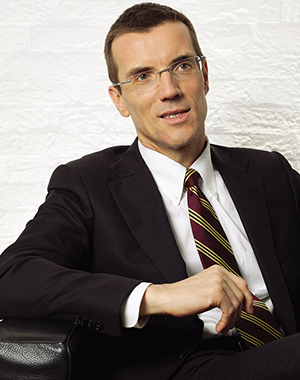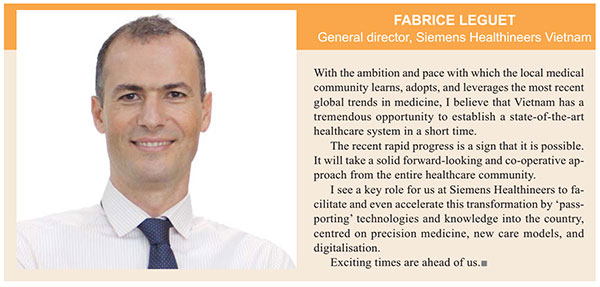Siemens Healthineers: Paving the way to a sustainable system of healthcare
 |
Looking at healthcare in Vietnam – where does the country stand today?
Vietnam is one of those exciting countries on the map. It is developing rapidly in multiple sectors thanks to strong fundamentals like its well-educated, young, and ambitious population; its growing middle class; a stable political system; and a favourable geographic position.
The country’s healthcare system is no exception, as it has seen an impressive expansion in recent years. The improvements in public health insurance coverage – at around 80 per cent, it is a benchmark for many countries – paired with government programmes to boost healthcare provisions in provincial areas and the increasing attractiveness of the sector for private investors, domestic or foreign, have enabled massive investments in the field of healthcare infrastructure, both in public and private hospitals.
Like in more developed countries, we observe growing private hospital chains as well as highly specialised hospitals with the ability to apply state-of-the-art methods and technology.
Where is Vietnam’s healthcare sector headed in the future?
The healthcare system will need massive development in the future to satisfy the needs of a growing and increasingly demanding population. While still young on average, the population is also ageing fast. Combined with changes in lifestyle, this increases the burden of chronic diseases like cancer or diabetes. Some diseases like lung, liver, and colon cancer have a particularly high prevalence in Vietnam and require early detection and sufficient infrastructure.
So the challenge lies in accommodating these growing needs without going overboard when it comes to spending, as seen in many developed countries such as the US. Healthcare spending in Vietnam is reasonably high at around 7 per cent of GDP – similar to China – and it is crucial for the country to keep costs sustainable, while continuing to improve access to and quality of healthcare for all citizens. This will require an increase in capacity and technology, but also new ways to optimise operations.
How can a company like Siemens Healthineers help to overcome this challenge?
As a global leader in healthcare and the world’s largest medtech infrastructure supplier, we continuously develop our portfolio, ranging from medical imaging and laboratory diagnostics to value-adding managed services, consulting, and healthcare IT.
We aim to make healthcare providers succeed in the ever-changing industry by helping them deliver better outcomes at lower cost. Our team aims to lead the transformation of healthcare with the ones delivering it, in Vietnam and other parts of the world.
We believe that this transformation will be made possible by focusing on four main areas: expanding precision medicine, which means providing precise diagnostics and guidance to foster prevention and individualised therapy; creating accessible and efficient healthcare delivery through new care models; improving the patient experience; and digitalising healthcare.
In Vietnam, we’ve established a solid base to leverage the capabilities of Siemens Healthineers and support the local healthcare community. We have been active in Vietnam since the early 1990s, and we have a couple of ‘firsts’ under our belt. For example, we installed the first MRI scanner in the country in 1996, followed by the first lab autom ation system in 2005.
More importantly, in recent years we have built up knowledgeable local teams able to advise, train, and support our customers in their projects. We’ve also established collaborations with teaching institutions and hospitals in Vietnam and created collaboration channels with best-in-class hospitals in developed countries to help transfer knowledge and best practices.
Our company is now the largest healthcare infrastructure solution provider in Vietnam with a strong presence in all key areas of healthcare, being one of the most active contributors to capacity building in the country.
How is the topic of digitalising healthcare applicable to Vietnam?
By offering hospitals matching IT for our systems, it is easier for them to control quality, since standards are automatically maintained, control points are transparent and systematically documented, exceptions are flagged, errors are avoided, and results are reproducible. Therefore, physicians and patients can trust in the quality of the results.
The medical community is in need of ways to increase confidence. The Ministry of Health has made it a priority to avoid redundancies and repeat tests. That way, unnecessary costs for the patients and their insurers can be avoided.
Thanks to increased transparency created by IT solutions, healthcare providers can also manage in real time and optimise the use of installed systems as well as the productivity of their staff. It enables them to ultimately provide services to more patients and reach higher return on investment.
Digitalisation can also improve patient care and accessibility. A Picture Archiving System allows for a smooth information flow between stakeholders in radiology. All crucial information such as clinical images is compiled digitally and is accessible anytime, anywhere, by any physician. Images from successive exams can be compared to monitor the evolution of a disease or the effect of a treatment and to adapt the treatment methods accordingly, for instance during a lengthy treatment of tumours. Images can also be shared remotely across hospitals, for example to get a specialist’s opinion. This is a great tool to improve accessibility and quality of healthcare in rural areas, where it is difficult to recruit specialists and where remote support from a physician elsewhere may be needed.
We at Siemens Healthineers have recently launched our Digital Ecosystem. One powerful application of that ecosystem is a cloud-based platform named ‘Teamplay’, which already connects more than 1,500 hospitals worldwide. Overall, the intention is to bring healthcare professionals from all around the globe together to advance medicine and human health. The network allows them to identify improvement potential on all levels. They can benchmark the performance of their hospital against others, and share information, protocols, and studies.
Imagine being a physician in Vietnam and having potential online access to the experience and knowledge of hundreds or more of your peers worldwide, who would be ready to share with you. This is a potential game-changer and a true accelerator for building competencies in the Vietnamese healthcare system. So we are looking forward to welcoming Vietnam to that network in the near future, as soon as this solution is released commercially in Vietnam.
As a company, we are also focusing our efforts on digitalisation and artificial intelligence. One of the buzzwords is “Cinematic Rendering”. It’s a new type of research visualisation that enables photo-realistic images of the human body to be produced in 3D, using data from imaging systems such as CT and MRI. The technology’s main benefits lie in improving surgery planning and communication between doctors and patients.

What is your vision for the future of healthcare in Vietnam?
We see an opportunity for Vietnam to boost its healthcare system by adopting the latest medical technology, IT, and healthcare management practices at an early stage. This could help in paving the way for a new era of healthcare in Vietnam, bringing high-quality care that the people of Vietnam deserve, while avoiding unsustainable costs. Vietnam does not have to go through the same learning curve as many developed countries, which now need to focus on cutting costs. This opportunity should not be missed.
We are determined to make the vision of quality healthcare for all, regardless of location, a reality. Breakthroughs such as the Digital Ecosystem will have a major part to play and it will be exciting to be part of the development of healthcare in Vietnam and witness how it takes off even further.
What the stars mean:
★ Poor ★ ★ Promising ★★★ Good ★★★★ Very good ★★★★★ Exceptional
Latest News
More News
- Allen & Gledhill recognised as Outstanding M&A Advisory Firm (December 18, 2025 | 14:19)
- Inside Lego Manufacturing Vietnam (December 18, 2025 | 11:45)
- The next leap in Cloud AI (December 11, 2025 | 18:19)
- Vietnam’s telecom industry: the next stage of growth (December 11, 2025 | 18:18)
- Five tech predictions for 2026 and beyond: new era of AI (December 11, 2025 | 18:16)
- CONINCO announces new chairman and CEO (December 10, 2025 | 11:00)
- How AWS is powering the next-gen data era (December 09, 2025 | 13:14)
- Outlook in M&A solid for Singapore (December 08, 2025 | 10:31)
- Vietnamese firms are resetting their strategy for global markets (December 05, 2025 | 17:04)
- LPBank Securities accelerates AI and data innovation with AWS (December 05, 2025 | 09:00)













 Mobile Version
Mobile Version